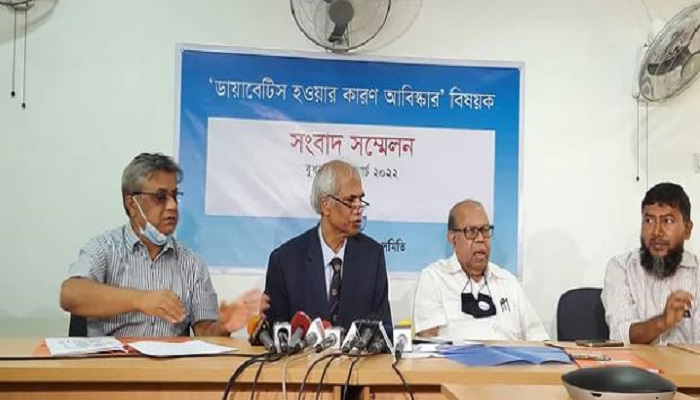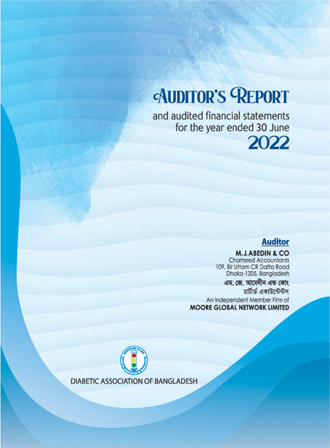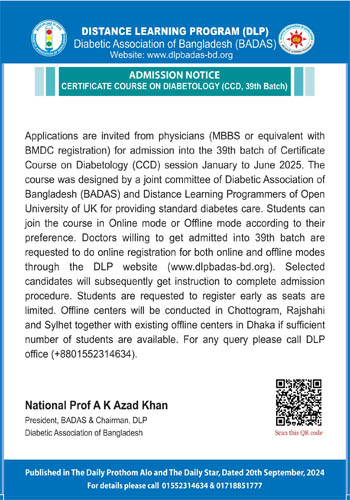ACTIVE BEYOND THE COUNTRY
Bangladeshi researchers on cusp of diabetes prevention
The scientists of Bangladesh have discovered a new cause of diabetes. According to them deficiency and declining of Intestinal alkaline phosphatase (IAP) is one of the main causes of this disease. IAP's major function is to protect intestinal tract against bacteria, aid in digestion, breakdown fats and some B vitamins, and promote bone formation.They said at a press conference held at BIRDEM in Dhaka. Former assistant professor of Harvard University, Bangladesh Diabetic Association's advisory professor and Lead researcher Madhu S. Malo told that 574 people between the ages of 30 and 60 were diagnosed with this new cause of diabetes in the last five years.
The results of the research have already been published in the British Medical Journal. The scientists expressed the hope that the discovery would play a major role in prevention and treatment of diabetes in future.
Diabetic Association of Bangladesh president Professor AK Azad Khan said the causes of 15 per cent of diabetes in Bangladesh are hereditary. "We've nothing to do to prevent this S. Malo told that 574 people between the ages of 30 and 60 were diagnosed with this new cause of diabetes in the last five years.

The results of the research have already been published in the British Medical Journal. The scientists expressed the hope that the discovery would play a major role in prevention and treatment of diabetes in future.
Diabetic Association of Bangladesh president Professor AK Azad Khan said the causes of 15 per cent of diabetes in Bangladesh are hereditary. "We've nothing to do to prevent this diabetes. But, the rest 85 per cent of diabetes are developed by people due to IAP-related reasons. Those who have low IAP are more at risk of developing diabetes. This is a groundbreaking discovery. The discovery proves that the scientists of Bangladesh are also capable of doing major works,"
A team of researchers from BIRDEM, Diabetic Association of Bangladesh, Rajshahi University, Jahangirnagar University, Bangabandhu Sheikh Mujib Medical University and Harvard University, were involved in the research.
Admission of Foreign Student at MBBS and other courses
12 Foreign Students from Canada (1), India (8) and Nepal (3) are studying at Ibrahim Medical College, BADAS. 2 Foreign Students from Nepal are studying in Pharmacology Department at Bangladesh University of Health Sciences.
Collaboration beyond the countries
Visit of scientists from abroad in the FY 2020-21
Department of Occupational and Environmental Health
Prof. Dr. Mathew Chandrakunnel, Director of Ecumenical Christian Centre (ECC), Bangaluru, India
Dept. of Reproductive and Child Health
Dr. Mahbubur Rahman, Department of Obstetrics and Gynecology and the Center for Interdisciplinary Research inWomen’s Health, University of Texas Medical Branch, Texas, USA and Adjunct Faculty, Dept. of Reproductive and Child Health, Bangladesh University of Health Sciences
Dept of Phrmacology
Prof Sadhana Amatya, Department of Pharmacy, Institute of Medicine, Tribhuvan are developed by people due to IAP-related reasons. Those who have low IAP are more at risk of developing diabetes. This is a groundbreaking discovery. The discovery proves that the scientists of Bangladesh are also capable of doing major works," A team of researchers from BIRDEM, Diabetic Association of Bangladesh, Rajshahi University, Jahangirnagar University, Bangabandhu Sheikh Mujib Medical University and Harvard University, were involved in the research.
Admission of Foreign Student at MBBS and other courses
12 Foreign Students from Canada (1), India (8) and Nepal (3) are studying at Ibrahim Medical College, BADAS. 2 Foreign Students from Nepal are studying in Pharmacology Department at Bangladesh University of Health Sciences.
Collaboration beyond the countries
Visit of scientists from abroad in the FY 2020-21
Department of Occupational and Environmental Health
Prof. Dr. Mathew Chandrakunnel, Director of Ecumenical Christian Centre (ECC), Bangaluru, India
Dept. of Reproductive and Child Health
Dr. Mahbubur Rahman, Department of Obstetrics and Gynecology and the Center for Interdisciplinary Research inWomen’s Health, University of Texas Medical Branch, Texas, USA and Adjunct Faculty, Dept. of Reproductive and Child Health, Bangladesh University of Health Sciences
Dept of Phrmacology
Prof Sadhana Amatya, Department of Pharmacy, Institute of Medicine, Tribhuvan University, Kathmandu, Nepal ii) Prof Khozirah Shaari, Laboratory of Natural Products, Institute of Bioscience, University Putra Malaysia, Selangor, Malaysia iii) Prof Banasri Hazra, Research Scientist, Dept of Pharmaceuticals Technology, Jadavpur University, India iv) Prof Lalith Jayasinghe National Institute of Fundamental Studies (NIFS), Kandy, Sri Lanka v) Prof Dr Muhammad Iqbal Choudhary, Director, International Center for Chemical and Biological Sciences, University of Karachi, Pakistan.
Collaboration established with University of Glasgow for a joint application to Medical Research Council, UK of NIHR Research and Innovation for Global Health Transformation Call for ‘Affordable Cardiac Rehabilitation: An Outreach Inter-Disciplinary Strategic Study (ACROSS)’
Achievement of CDIC
SWEET (Better control in Pediatric and Adolescent diabetes: Working to create Centers of Reference): the program has been working since 2008 with the support of the European Union. It aims at ensuring improved services for the prevention, diagnosis and management of Type-1 and Type-2 diabetes in children and adolescents. Bangladesh Diabetic Association is providing medical care to diabetic children and adolescents (under 26) in Bangladesh through two projects: Changing Diabetes in Children (CDiC) and Life for a Child (LFAC). Since 2015, both CDiC and LFAC have been sharing data under the name of CDiC in the 'SWEET' program. CDiC ranked 10th in 2019, followed by 4th in 2020 and 1st in 2021. Winning the 1st place resulted in prize money of €2,500 along with a certificate.




